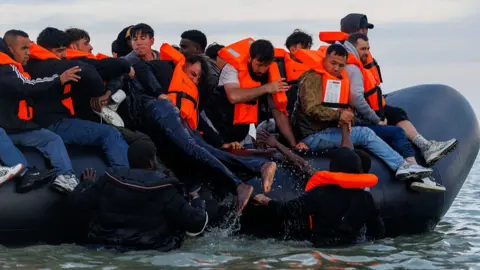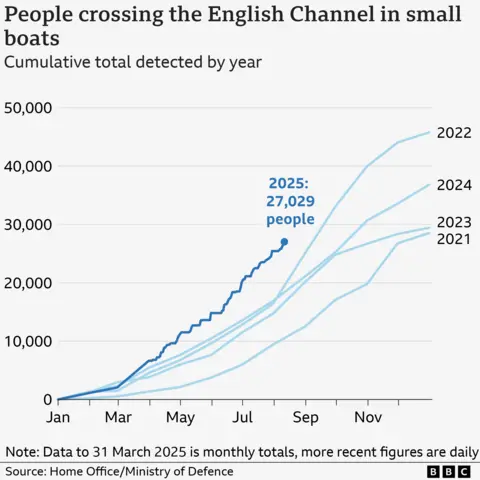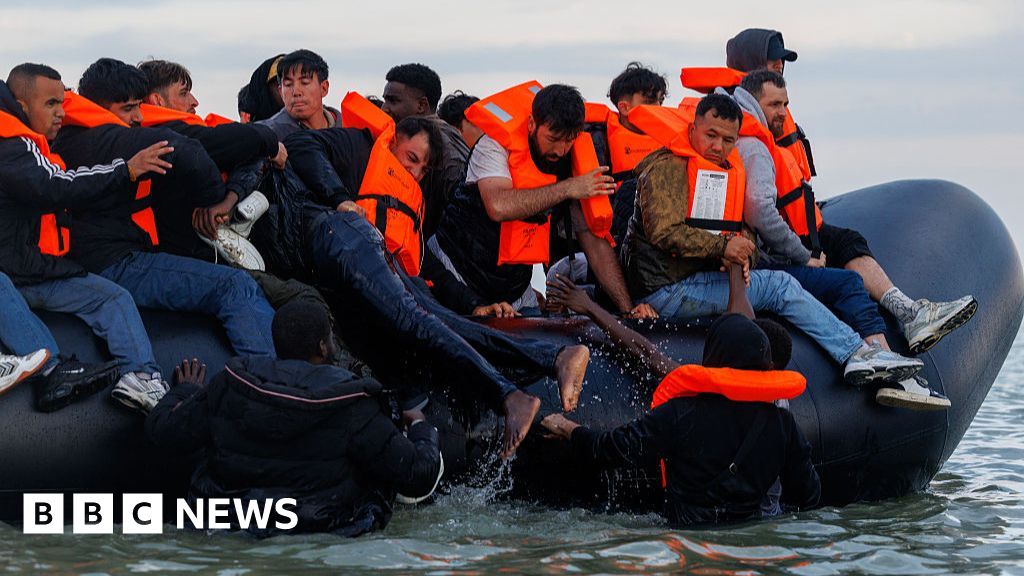BBC News
Political correspondent
 Getty Images
Getty ImagesThe number of migrants to cross the English Channel in small boats since Labour came to power last summer has surpassed 50,000.
Home Office data shows 50,271 people have made the journey, after 474 migrants arrived on Monday.
Separately, French authorities confirmed a woman died on Monday while trying to board a boat to make the crossing to the UK.
Referring to the figures, Education Secretary Bridget Phillipson said the government “will turn this around”, adding that she appreciates “the frustrations that people feel”.
But Conservative leader Kemi Badenoch said the figure shows that “Labour’s plan to smash the gangs was just a slogan.”
The woman is believed to have been in her 30s and died on Malo beach in Dunkirk, according to the Utopia 56 organisation, which supports displaced migrants at the French border.
Local media report the incident happened at around 4am on Monday morning and French authorities said she died despite resuscitation efforts from emergency services at the scene on the French coast.
The Home Office said it was aware of the incident but would not be commenting further.
According to the International Organization for Migration (IOM), a UN agency, at least 20 people have died this year attempting to cross the Channel. Its figures include people who were travelling to a crossing point and died in other circumstances, such as car crashes or because of medical issues.
The latest crossing figures come as ministers continue to grapple with how to crack down on people-smuggling gangs – a key pledge of Sir Keir Starmer’s when he became prime minister.
Government minister Baroness Smith earlier told the BBC the crossings figure was an “unacceptable number of people” but pointed to the “one in, one out” returns deal with France as a deterrent.
The pilot will see the UK return some migrants to France in exchange for receiving the same number of asylum seekers who are believed to have legitimate claims.
Last week, a government source told the BBC several dozen migrants had been detained under the UK’s new agreement with France so far, but did not provide a specific number.
The first returns are due to happen within weeks – but the initial numbers are expected to be small.
Dunkirk’s mayor, Patrice Vergriete, criticised the returns scheme, saying it would “only increase risk-taking and tension on the entire coastline of the region”.
Speaking after Monday’s fatal incident, he said the “absurd, ineffective and terribly cruel management of the migration crisis” could not continue.
Figures released on Tuesday confirmed that the number of small boat crossings from the date that Labour came to power on 5 July last year had passed 50,000 by Monday, 11 August.
This is more than 13,000 higher than for the same period a year earlier – as between 5 July 2023 and 11 August 2024 there were 36,346 migrant crossings in small boats.
This is not the first time 50,000 people have crossed the Channel during a 403-day period.
Between 8 October 2021 and 14 November 2022, under the previous Conservative government, there were 53,587 arrivals by small boat.
Government sources say there were an unusually high number of days with calm and warm weather at the start of this year, which partially contributed to the high number of crossings.
While on a visit to Derby, Phillipson told the BBC the government had “inherited an enormous challenge” when it comes to border control.
“We will turn this around with the extra measures that we’re putting in place,” she said.
The Tories accused Labour of overseeing the “worst illegal immigration crisis in our history”.
“This is a taxpayer-funded ferry service for the people-smuggling trade. Every illegal immigrant should be removed immediately upon arrival,” said shadow home secretary Chris Philp.
Reform UK leader Nigel Farage said: “As I predicted five years ago, unless we deport illegal migrants the invasion will be huge. 50,000 since this weak prime minister took office and there is no sign of it stopping.”
The Home Office said it wants to end dangerous small boat crossings and had put together a “serious plan” to take down networks.
But politically the 50,000 milestone is deeply uncomfortable for the government, given its promise to smash the gangs that drive the small boat crossings.
More migrants crossed the Channel between January and August 2025 than in the same period last year.

Government sources argue there is no silver bullet to bring the numbers down but insist a series of practical changes, such as measures to tackle illegal working and deport foreign criminals more quickly, are part of a wider plan to address the problem.
Baroness Smith said the Border Security, Asylum and Immigration Bill, which is going through Parliament, would give ministers greater powers to “challenge the gangs”.
Other measures announced include prison sentences of up to five years for criminals advertising illegal Channel crossings online, and increased funding for more National Crime Agency officers.
The latest moves also come in the wake of a series of protests and counter demonstrations outside UK hotels which are used to house asylum seekers.
“People do not cross the Channel unless what lies behind them is more terrifying than what lies ahead,” said Enver Solomon, chief executive of the Refugee Council charity.
The charity’s frontline workers say the men, women and children travelling in small boats are “often fleeing places like Sudan, where war has left them with nowhere else to turn”, he added.
“To stop smugglers for good, the government must expand safe and legal routes, such as allowing family members to travel to be with their loved ones who are already settled in the UK,” he said.
“Without these measures, desperate people will continue to take dangerous journeys, and the criminal gangs are likely to simply adapt their approaches.”



